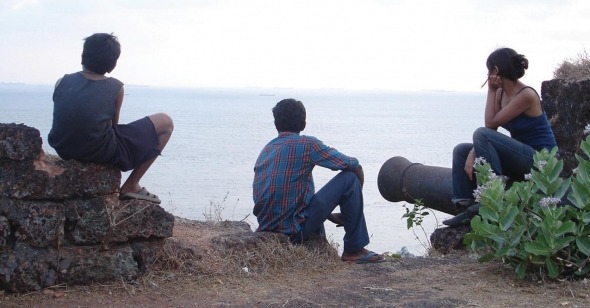Adult Swim
By Michael Koresky
The Pool
Dir. Chris Smith, U.S., Vitagraph Films
The value of a film like Chris Smith's The Pool becomes more tangible when you begin to imagine what a lesser filmmaker might have wrought from the same material. Extending his sympathy for, and fascination with, the American working class beyond the boundaries of his home country, Smith, the director of American Job, Home Movie, and American Movie, traveled to the small Indian state of Goa, its west coast the shores of the Arabian Sea, to make his latest film. The Pool is an unostentatiously crafted work about the daily travails and aspirations of an Indian teenager working at a hotel in the Goan capital of Panjim
to help support his family, who live in an impoverished nearby rural village, and who dreams of something better by enviously staring at a nearby wealthy man’s shimmering backyard pool from his tree perch. It could have been either mawkish or too self-consciously aping of a particularly neorealist style; instead Smith avoids both modes of address, using an expressive, incisive, and merely observant camera that rarely, if ever, calls attention to itself.
This doesn’t mean that Smith is unburdened by a certain pretense, of course. There’s no doubt that in filming The Pool in India, even going so far as to adapt an American author’s short story to this new, undeniably exotic locale (Randy Russell’s tale is actually set in Iowa), Smith is somewhat “out of his element,” and therefore there can’t help but be an inherent condescension, however compassionate, in its portrayal of India’s sharp class divide, spoken by its actors in Hindi, a language the director doesn’t understand. But Smith refuses a clinical or sentimental approach (there are no eye-rolling daydream sequences of its protagonist taking a slo-mo dive into the deep end, for instance), instead following his main charatcter, Venkatesh (played with appealing humility by the refreshingly gawky-featured Venkatesh Chavan), with steadfast attention that somehow never feels intrusive.
Part of this accomplishment might be that Smith doesn’t rely on close-ups, allowing Venkatesh, in crisp, bright images, to become part of his surroundings, whether it’s in the dingy hotel he sweeps and scrubs, or the bustling commercial streets where he and his young friend Jhangir (Jhangir Badshah) try to sell plastic bags to make extra money. When Venkatesh dares to breach the outer walls of the home he has begun to quietly crave, hoping to get near the pool which goes mysteriously unused, he forms bonds of varying intensity with the taciturn, philosophical owner, played by Nana Patekar (a well-known Indian actor), and his teenaged daughter, Ayesha (Ayesha Mohan), offering himself as a hired hand, to help remove dead leaves from the backyard and other various chores. The seduction of the pool remains integral to Venkatesh’s motivations, but it becomes an object of false comfort the more he finds out about the family’s relationship to it.
The Pool lost the grand prize at Sundance last year to Christopher Zalla’s Padre Nuesto (released here in 2008 as Sangre de mi sangre), a good example of a film that falls into the traps that Smith’s film avoids. Also made by a white American filmmaker focusing on a subtitled social milieu, Zalla’s film objectified its Mexican immigrant protagonists by thrusting them into a derivative, violent action narrative. By contrast, Smith surveys his characters with a modest sympathy that fits their quotidian lives and humble ambitions, and even when things get darker in its third act, Smith never drowns them in overdetermined plot machinations. Smith’s transition from documentary to fiction filmmaking is quite welcome, and, along with Momma’s Man, Baghead, and The Order of Myths, it’s another example of a quality independent cinema renaissance in the U.S.
